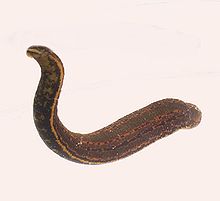Hirudo medicinalis
| Hirudo medicinalis | |
|---|---|
 |
|
| Scientific classification | |
| Kingdom: | Animalia |
| Phylum: | Annelida |
| Class: | Clitellata |
| Order: | Hirudinida |
| Family: | Hirudinidae |
| Genus: | Hirudo |
| Species: | H. medicinalis |
| Binomial name | |
|
Hirudo medicinalis Linnaeus, 1758 |
|
Medicinal leeches are any of several species of leeches, but most commonly Hirudo medicinalis, the European medicinal leech.
Other Hirudo species sometimes used as medicinal leeches include (but are not limited to) Hirudo orientalis, Hirudo troctina, and Hirudo verbana. The Mexican medical leech is Hirudinaria manillensis, and the North American medical leech is Macrobdella decora.
The general morphology of medicinal leeches follows that of most other leeches. Fully mature adults can be up to 20 cm in length, and are green, brown, or greenish-brown with a darker tone on the dorsal side and a lighter ventral side. The dorsal side also has a thin red stripe. These organisms have two suckers, one at each end, called the anterior and posterior suckers. The posterior is used mainly for leverage, whereas the anterior sucker, consisting of the jaw and teeth, is where the feeding takes place. Medicinal leeches have three jaws (tripartite) that look like little saws, and on them are about 100 sharp teeth used to incise the host. The incision leaves a mark that is an inverted Y inside of a circle. After piercing the skin and injecting anticoagulants (hirudin) and anaesthetics, they suck out blood. Large adults can consume up to ten times their body weight in a single meal, with 5-15 ml being the average volume taken. These leeches can live for up to a year between feeding.
Medicinal leeches are hermaphrodites that reproduce by sexual mating, laying eggs in clutches of up to 50 near (but not under) water, and in shaded, humid places.
...
Wikipedia

